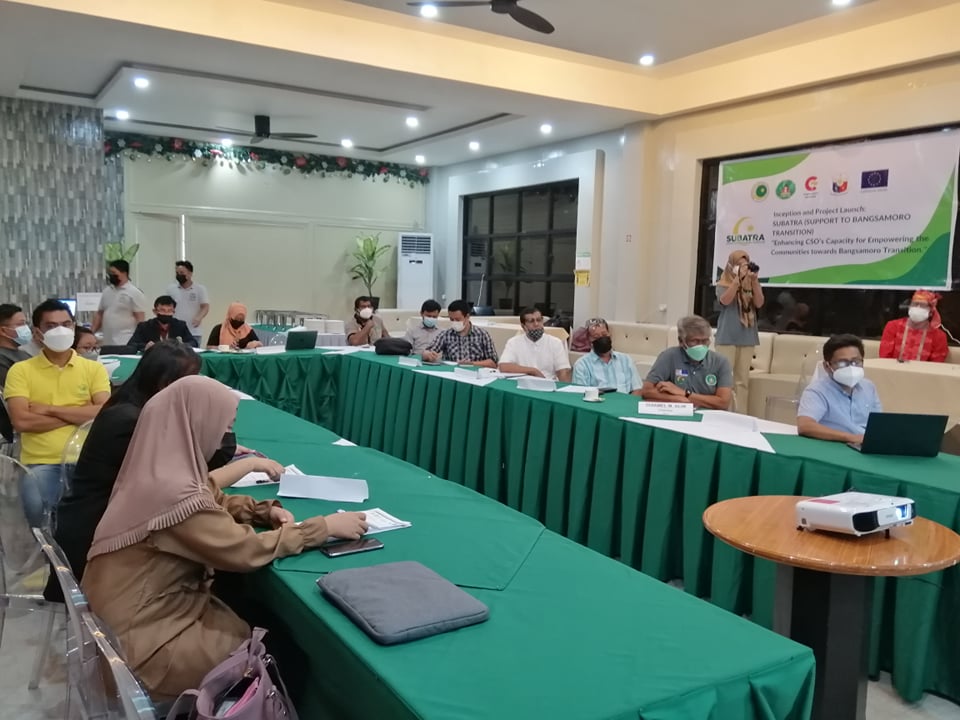COTABATO CITY – The European Union (EU) and the Spanish Agency for International Cooperation and Development (AECID) launched their partnership with the Consortium of Bangsamoro Civil Society (CBCS) on November 4, 2021, paving the way for strengthened capacities of civil society organizations (CSOs) in the Bangsamoro Autonomous Region in Muslim Mindanao (BARMM).
The partnership supports the intended results of the Support to Bangsamoro Transition (SUBATRA) Programme’s Justice and Society Project, which provides CSOs a platform to meaningfully contribute to a smooth and timely undertaking of the BARMM transition period.
The EU-funded SUBATRA Programme, also co-funded by AECID, helps BARMM lay the foundation for lasting peace and development in the region by strengthening the capacities of its institutions, including civil society.
EU and AECID’s partnership with CBCS aims to harness the role of civil society in strengthening alternative dispute resolution (ADR), prevention of violent extremism (PVE), and transitional justice and reconciliation programs at the grassroots level.
In his message during the launch, Jorge Moragas Sanchez, Spanish Ambassador to the Philippines, reaffirmed the Spanish Government’s commitment to the consolidation of peace in the Bangsamoro.
“Through the work of CBCS and its partners, we will promote the establishment of mechanisms for the relationship and participation of civil society in the design and execution of public policies favoring the legitimization of the new institutional framework and providing better attention to the needs of the people,” the Ambassador said.
Mr. Christoph Wagner, Head of Cooperation of the EU Delegation in the Philippines, encouraged partner CSOs in BARMM to think beyond the lifetime of the SUBATRA Programme, ensuring that sustainability measures are in place and their capacities strengthened in the medium and longer term.
“CSOs can bring the knowledge and experience not only in peace and development but also socio-economic support. The Bangsamoro government’s support is essential in harnessing the potential of CSOs towards achieving sustained peace and development in BARMM, ” said Wagner.
Chief Minister Ahod Ebrahim recognized the role of CSOs in peacebuilding in BARMM.
“The work of our CSOs in shaping the Bangsamoro peace process is undeniable. It is through their passion and belief in a lasting peace that we get to reach out with various sectors and communities, making this entire journey of the peace process more inclusive,” he said.
Mr. Guiamel Alim, CBCS founding chair, said the CBCS will work together with the Kadtuntaya Foundation, Inc., Teduray Lambangian Women’s Organization, and Kalisan Action Network, Inc., CBCS will work closely with the different sectors, including religious, women, youth, and indigenous peoples, among others, to push for holistic and people-centered approaches to ADR, PVE, and transitional justice interventions.
The CBCS will also help strengthen the participation of CSOs in advocating for a people-centered development agenda at the Bangsamoro Transition Authority and the local government.
Mr. David Diciano, Office of the Presidential Adviser on the Peace Process Undersecretary and Chairperson of the Peace Implementing Panel for the Government of the Philippines and Moro Islamic Liberation Front Peace Accord, said that governance is only responsive and holistic with the participation of the civil society.
The CBCS interventions under the SUBATRA Justice and Society Project will run from September 2021 to August 2023 and shall be implemented across 25 municipalities in BARMM.
![]()








